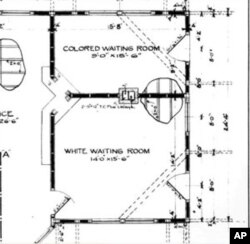One hundred years ago, a Delaware chemical tycoon, William duPont, ordered a train depot built at Montpelier, which was once the Virginia estate of America's fourth president, James Madison. DuPont owned Montpelier at the time.
The station was needed for trains that brought in supplies, rural farm workers, and the duPont family's fancy private coaches.
Like other southern states, Virginia was a place where blacks and whites lived together but very much apart.
Racist laws required African Americans to drink from separate public drinking fountains, climb back stairs to sit in the balconies of theaters, and wait in much smaller rooms at bus and train stations.
So William duPont built his depot from a standard Southern Railway floor plan that specified one entrance marked "White" and another marked "Colored."
Passenger trains have not run to Montpelier for 40 years, and the depot closed in 1974. Its freight room stayed open as the estate's post office.
Montpelier is now owned by the National Trust for Historic Preservation. It set up a foundation that has been renovating buildings throughout the estate. And when it got around to the train station, it made a controversial call.
The restored depot would look just like it had in 1910 - with its "White" and "Colored" entrances.
This was highly unusual, since most places in the South have tried to paint over or tear down remnants of their segregationist past. Black leaders who opposed the move said the station would be, as Washington Post reporter Philip Kennicott put it, one of the toxic byproducts of oppression.
But other African Americans, including journalist Juan Williams, who spoke at the dedication, supported re-marking the "White" and "Colored" entrances.
"This is a place of healing," he told the audience at the dedication. "This is a place that can . . . help us understand what took place here."







